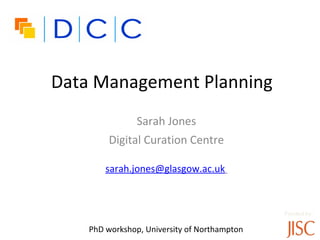
Data Management Planning for PhDs
- 1. Data Management Planning Sarah Jones Digital Curation Centre sarah.jones@glasgow.ac.uk Funded by: •PhD workshop, University of Northampton
- 2. What is research data management? •5. •1. “the active management and •Preservation •& Re-Use •Create appraisal of data over the lifecycle of scholarly and scientific interest” •4. •2. •Publication •Active Use •& Deposit Data management is part of •3. •Documentation good research practice
- 3. What is a data management plan? A brief plan written at the start of your project to define: • how your data will be created? • how it will be documented? • who will access it? • where it will be stored? • who will back it up? • whether (and how) it will be shared & preserved? DMPs are often submitted as part of grant applications, but are useful whenever you’re creating data.
- 4. Why develop a DMP? • to help you manage your data • to make informed decisions so you don’t have to figure out things as you go • to anticipate and avoid problems e.g. data loss • to make your life easier!
- 5. What should a DMP cover? 1. What data will you produce? 2. How will you organise / look after the data? 3. How will you document the data? 4. What data will be deposited and where? 5. Who will be interested in re-using the data?
- 6. •1. What data will you produce? • What type of data will •5. •Preservation •1. you produce? •Create •& Re-Use • What types of file format? •4. •Publication •2. •Active Use • How easy is it to create •& Deposit or reproduce? •3. •Documentation • Who owns and is responsible for it?
- 7. •2. How will you look after the data? •5. • Is your data safe? •1. •Preservation •Create • How is your data •& Re-Use backed up? •4. •2. • Can you access it •Publication •& Deposit •Active Use when you need to? •3. • Is your data organised? •Documentation
- 8. •3. How will you document the data? • Do you still understand •5. •1. your older work? •Preservation •Create •& Re-Use • Is the file structure / naming understandable? •4. •Publication •2. • Are there standards you •Active Use •& Deposit can use? •3. •Documentation • How do you handle versions?
- 9. •4. What data will be deposited and where? • Are you expected to •5. •1. share your data? •Preservation •Create •& Re-Use • Are you allowed to share your data? •4. •Publication •2. • Which data will be •& Deposit •Active Use included in your publication / thesis? •3. •Documentation • Which can be discarded?
- 10. •5. Preservation and Re-use • How long will your data •5. •Preservation •1. •Create be reusable for? •& Re-Use • Do you need to prepare your data to deposit in •4. •Publication •2. •Active Use an archive? •& Deposit •3. • How will you make sure •Documentation you get citations & impact?
- 11. A useful framework to get you started •Think about why the questions are being asked – why is it useful to consider that? •Look at examples to help you understand what to write •www.icpsr.umich.edu/icpsrweb/content/datamanagement/dmp/framework.html
- 12. Help from the DCC •https://dmponline.dcc.ac.uk •www.dcc.ac.uk/resources/how-guides/develop-data-plan
- 13. ...a web-based tool to help researchers write Data Management Plans according to different funder requirements We’re currently enhancing it with practical examples, boilerplate text and tailored support https://dmponline.dcc.ac.uk
- 14. How DMP Online works Create a plan based on relevant funder / institutional templates... ...and then answer the questions using the guidance provided
- 15. Tips for writing DMPs • Seek advice - consult and collaborate • Consider good practice for your field • Base plans on available skills & support • Make sure implementation is feasible
- 16. Sources of guidance • ICPSR framework for a data management plan www.icpsr.umich.edu/icpsrweb/content/datamanagement/dmp/ framework.html • How to develop a data management and sharing plan www.dcc.ac.uk/resources/how-guides/develop-data-plan • UKDA’s manage and share your data guide • http://data-archive.ac.uk/media/2894/managingsharing.pdf
- 17. Thanks - any questions? Content for this sessions has been taken from Research360, a Jisc funded project which developed DMP resources for PhD students: http://blogs.bath.ac.uk/research360/category/training
- 18. Exercise: writing a DMP • Fill in the template based on your PhD • Discuss your plan – Did you know what to write? – Were the questions clear / understandable? – Was it useful to think about these issues?
Notes de l'éditeur
- I recommend this ICPSR resource It explains the importance of different questions as a pointer to how to answer Examples are given. This is the most frequent request we get at DCC - examples help researchers think of what to write for their context
- The DCC has produced a How to guide on writing DMPs and developed a tool to help
- There are various templates in DMP Online based on different funder requirements and institutional customisations
